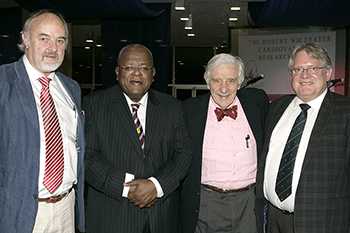Latest News Archive
Please select Category, Year, and then Month to display items
19 November 2018
|
Story Charlene Stanley
|
Photo Charlene Stanley
 Prof John Mubangizi, Dean of the Faculty of Law, encouraged delegates at the Fifth Annual International Mercantile Conference to share ideas on best international practice in their various fields.
Prof John Mubangizi, Dean of the Faculty of Law, encouraged delegates at the Fifth Annual International Mercantile Conference to share ideas on best international practice in their various fields.
“Don’t say anything online that you wouldn’t want plastered on a billboard with your face on it.”
This famous quote by international tech expert Erin Bury should be a guiding light when it comes to online habits in the workplace, according to Francois Cilliers, UFS Lecturer in Mercantile Law.
In his presentation Could Social Media be the Gateway to Employment Discrimination? he warned that employees have a responsibility not to bring their employers in disrepute through their comments on social media.
“Posts, updates, tweets, and comments are considered to be publications and can therefore never be seen as privileged information,” he explained.
Responsibility on employees and employers alike
He pointed out that employers also had a responsibility regarding the way in which they use the information about prospective employees obtained via social media.
“Nowadays, approximately 75% of companies hire through social media. In the US, recruiting companies spend hours researching candidates, making full use of what they can find on social media. It was found that 50–80% of employers frowned upon posts and pictures featuring drug and alcohol abuse, profanity, and bad grammar.”
He warned that employers needed to tread lightly, as a decision not to employ someone as a result of information on the prospective employee’s political views and sexual orientation could constitute unfair discrimination as set out in the Employment Equity Act.
“An employer who wishes to use a screening process (utilising social media) has to prove that the information and the process is objectively necessary and can be justified with reference to the inherent requirements of the job,” he explained.
“As technology and electronic systems advance, so too should the applicable labour laws.”
Cilliers’ presentation formed part of the Fifth Annual International Mercantile Law Conference recently hosted by the Faculty of Law on the Bloemfontein Campus.
Incorporating new technology in teaching and research
“This conference is an opportunity to share ideas on best practice in what is perceived as a ‘difficult’ field within Law,” said Prof John Mubangizi, Dean of the Faculty of Law, as he opened the proceedings. Topics in the discussion sessions ranged from Racism in the workplace and The underrepresentation of females in the judiciary, to Decriminalisation of cannabis: A recipe for healthy employer-employee relations?
“Conferences such as these help us to take advantage of the newest developments in technology to advance our teaching and research,” said Prof Mubangizi.
“To quote Einstein: ‘We can’t solve problems by using the same kind of thinking we used when we created them.’”
UFS Cardiovascular Research Centre a South African solution to continental crisis
2015-11-30

From left are: Dr Robert Kleinloog, president of the Society of Cardiothoracic Surgeons of South Africa, Prof Jonathan Jansen, Vice-Chancellor and Rector of the University of the Free State (UFS), Prof Robert Frater after which the Robert W M Frater Cardiovascular Research Centre was named and Prof Francis Smit, head of Cardiothoracic Surgery at the UFS, at the launch of the new centre.
Photo: Johan Roux |
“You don’t have to be in New York or any big city in the world to establish a cardiovascular centre that delivers work of world standards. I’ve learned that extraordinary things are achieved by ordinary people who apply themselves accordingly. This research centre is a South African solution to a continental challenge”.
These were the words of Prof Robert Frater at the opening of the new Robert W M Frater Cardiovascular Research Centre in the Department of Cardiothoracic Surgery at the University of the Free State (UFS) School of Medicine.
The centre, one of only two of the kind in the country, will focus on bioengineering and cardiovascular research. It was opened on Wednesday 18 November 2015 in the Francois Retief Building on the Bloemfontein campus.
The centre is named after Prof Robert W.M Frater in recognition of his vast contribution to the UFS. He is internationally recognised for his outstanding academic, clinical, and scientific contributions to cardiac surgery. Prof Frater has also been actively involved in research activities of the Department of Cardiothoracic Surgery for the last 10 years. In 2011, he received an honorary doctorate from the UFS.
Under the leadership of Prof Francis Smit, head of Cardiothoracic Surgery, the department has been described as a dynamic unit at the forefront of meeting the different changes in Southern Africa while maintaining an excellent clinical and academic track record.
At the opening, Prof Jonathan Jansen, Vice-Chancellor and Rector of the UFS, thanked Prof Frater for his presence at, involvement in, and support of the UFS. “I am looking forward to working in collaboration with the department to make this university a research centre of excellence in the continent”, he said.
The centre has existing endeavours already in operation, including Population projects, Clinical studies, and Clinical pathology, to name three. In collaboration with the Central University of Technology, the University of Stellenbosch, and Charite University of Berlin, among numerous others, the centre will be an appropriate help to an African challenge.
Its introduction promises advanced research outcomes with the potential to make the Department of Cardiothoracic Surgery a world-class competitor.